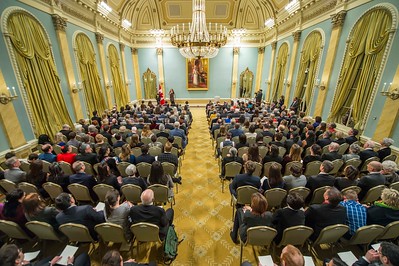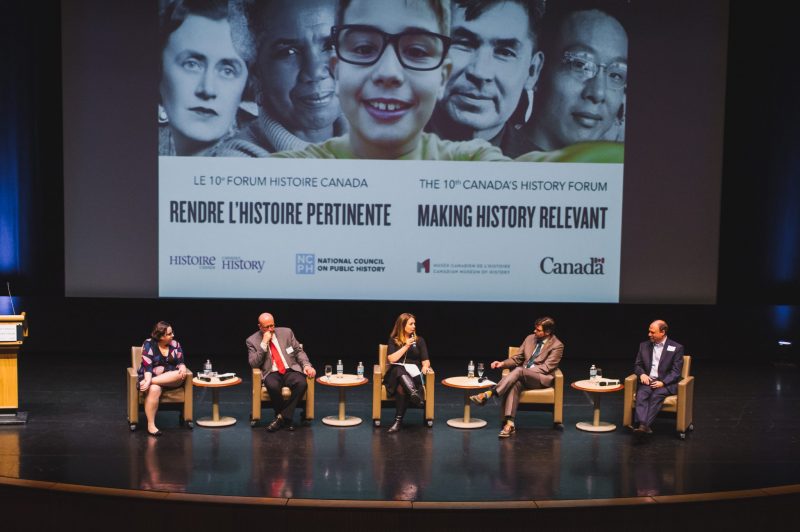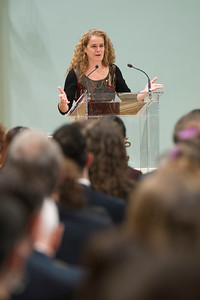History Relevance in Canada
24 January 2018 – Tim Grove

Governor General’s History Awards, November 2017. Photo credit: Brittany Gawley Photography
Recently I ended a trip to Canada a bit jealous that Canadians have figured out how to give history a national spotlight, something that has proven more elusive in the United States. While we do find ways to award excellence in history, they are not concentrated and diverse and on such a national stage.
I had been invited to Canada to represent the History Relevance initiative and to share a little of the history, motivations, and goals of this national effort. Stephanie Rowe, executive director of the National Council on Public History, and I participated in several events during Canada History Week 2017, an annual showcase of Canada’s rich history. Three big events of the week revolved around the Governor General’s History Award winners from across the nation.
Janet Walker, president and CEO of Canada’s History, the organizer of the event, welcomed everyone, saying “History is essential for understanding the complex issues that face us today. As individuals, communities, and nations, we engage with the past to help navigate the present and contemplate the future. History stimulates us to be thinkers, innovators, leaders, and engaged citizens.”
At the Canada’s History Forum, held at the Canadian Museum of History and hosted in collaboration with NCPH, the theme was “Making History Relevant.” In my presentation during the morning session, I discussed why History Relevance was founded and how it produced the Value of History Statement. In particular, I emphasized the effort within History Relevance to strengthen history’s “brand,” using the Value of History Statement to develop and share a common language for use by history practitioners. I also highlighted the need to gather solid data to show effective history projects that impact their communities. Other speakers included Jean-Pierre Marin, staff historian for Indigenous and Northern Affairs Canada and former NCPH board member, Andrea Eidinger, creator and editor of the blog Unwritten Histories, Dominique Trudeau, head of education at the McCord Museum in Montreal, and Lindsay Gibson, assistant professor of social studies education at the University of Alberta and participant in the Historical Thinking Project. All speakers highlighted the challenges of presenting complex history.

History Forum at the Governor General’s History Awards. Photo credit: Brittany Gawley Photography
The evening featured a gala dinner in the great hall of the Canadian Museum of History, next to the towering totems. The enthusiastic guests included the history award winners, members of Parliament (MPs) and the museum’s president and CEO.
The day before the award winners had traveled to Parliament Hill to meet with MPs, less to advocate than to brag about their projects.

Statement from the Governor General of Canada, November 2017. Photo credit: Brittany Gawley Photography
The second day was the big awards ceremony at Rideau Hall, the the residence of Canada’s governor general, the Queen’s representative. Governor General Julie Payette, a former astronaut, presided over the formal ceremony that honored students, teachers, authors, and public historians for their excellence in making history accessible to Canadians. Their ages ranged from about seven to seventy. Eight teachers received awards, including a teacher whose students created a museum that has grown to six hundred items and one thousand visitors, two teachers who created an oral history program matching students with veterans, and two teachers who developed a program for high school students at the First Nations University of Canada focused on treaty history and education. Museum practitioners were honored for opening a new permanent gallery called Hodul’eh-a—A Place of Learning in the Exploration Place Museum and Science Centre in Prince George, British Columbia. This gallery is a model for how Indigenous and non-Indigenous communities can work together to preserve, understand, and respect Indigenous history and experiences. Exploration Place is located within Lheidli T’enneh Memorial Park—the site of the traditional hunting grounds and village for the Lheidli T’enneh Nation.
Thinking back on my visit to Ottawa, I am encouraged by the potential power of shared efforts and common goals. The history communities in both countries strive to demonstrate history’s relevance and the power of teaching historical thinking skills. The Historical Thinking Project is a national Canadian effort to give attention to promoting critical historical literacy in the twenty-first century at learning venues across Canada. As Stephanie Rowe said in her opening and closing remarks for the Forum, “we hope this is just the beginning of more collaboration between public historians in the US and Canada. There are many of us working to move the study of history from nice to essential and our efforts will only be strengthened by our awareness of one another and our efforts to work together.” I also invited attendees to ask their organizations to endorse History Relevance’s Value of History Statement and actively articulate the seven values it features. Together, we can work to raise the profile of history.
~Tim Grove is chief of museum learning at the Smithsonian National Air and Space Museum and a founding member of the History Relevance initiative.



